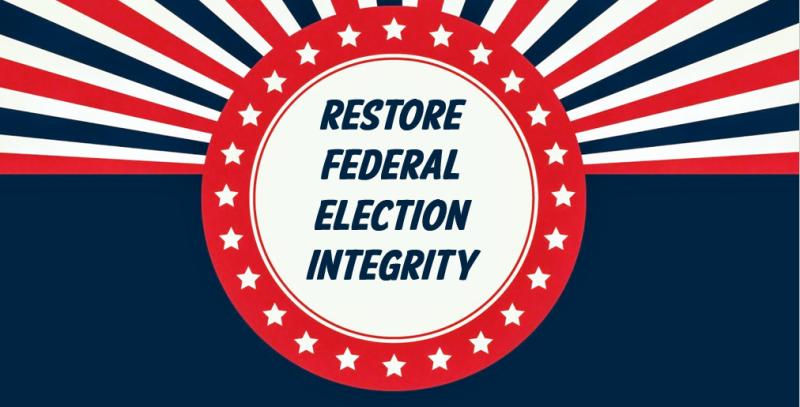Take Action
Education
Our Impact
Action Projects
- Get US Out of the UN
- Stop a Constitutional Convention
- Make America STATES Again
- Stop Agenda 2030
- End The Fed
- Support Your Local Police
- Stop Mass Migration
- Restore Election Integrity
- Save our Children from Public Schools
- Expose the Deep State
- Get US Out of the USMCA
- Stop the North American Union
- Stop the War on Farmers
- Freedom is the Cure
- Stop the Globalists’ Trade Agenda
- View More →
Featured

Congress must repeal every unconstitutional federal election law, prevent the passage of laws that encourage voter fraud, and — working within its constitutional limitations — enact legislation that builds confidence in our Republic's elections.
Contact your U.S. Representative and Senators
Please help restore election integrity by contacting your U.S. representative and senators. Inform them of the federal election-related laws that violate the Constitution and undermine election integrity. Urge them to repeal those laws, prevent passage of future negative laws, and to enact constitutional legislation that substantively combats voter fraud.
Why it Matters
URGENT: U.S. House Republicans are trying to enact the SAVE Act by attaching it to an “omnibus” bill, such as the annual National Defense Authorization Act or the pending continuing-resolution bill. Although the SAVE Act — which would require states to verify whether individuals registering to vote are U.S. citizens — sounds good, it would unconstitutionally further federalize elections while failing to fix the root cause of non-citizens voting in elections. For example, the SAVE Act merely amends — rather than fully repeal — the unconstitutional National Voter Registration Act, which infringes on state sovereignty and is a major reason why non-citizens have been able to vote in elections. Also, it calls for strict compliance with REAL ID, an unconstitutional federal program that acts as a first step toward a national ID. Furthermore, Congress should focus on slashing unconstitutional spending, rather than attaching a “shiny object” to a bloated spending bill. Urge Congress to reject false solutions, and to instead repeal the many existing dangerous and unconstitutional federal election laws.
Congress must take action to restore election integrity and enforce the U.S. Constitution. Accordingly, it must repeal every unconstitutional federal election law — which also undermine election integrity — and prevent new ones from passing.
Both Article I, Section 4, and Article II, Section 1, of the United States Constitution give state legislatures primary authority over congressional elections. However, it also gives Congress authority to override state laws in this specific area. These provisions, as affirmed by The Federalist, No. 59, don’t give Congress any authority over state and local elections.
Several existing federal laws — all of which exceed Congress’ rightful authority under the Constitution — contribute to the lack of election integrity and security in our Republic.
One such example is the National Voter Registration Act of 1993, also known as the Motor Voter Act, or NVRA. This law unconstitutionally requires states to automatically register voters when they apply for driver’s licenses or public assistance. This and other provisions of the law have contributed to inaccurate voter registrations — with some states and counties having more people registered to vote than eligible citizens. Congress must repeal this unconstitutional law.
Another harmful federal law is the ironically-titled Help America Vote Act of 2002 (HAVA). Among the law’s other provisions, it requires states to purchase electronic voting machines. In the panic to comply with this federal law, states purchased machines with technical problems and which did not leave a paper trail, thus undermining election integrity. Even more worrisome, some of this new equipment and software originated in foreign countries. Congress must repeal the Help America Vote Act.
The Uniformed and Overseas Citizens Absentee Voting Act (UOCAVA), originally passed in 1986, also is unconstitutional as it regulates state governments’ election procedures. Furthermore, this law has forced states to expand absentee voting, thus undermining election integrity.
Another attack on election integrity at the federal level is Title 18 of the US Code regarding Voting by Aliens, Section 611c. This amendment to U.S. immigration law effectively allows non-citizens to vote in federal elections if “the alien reasonably believed at the time of voting … that he or she was a citizen of the United States.” This section, combined with Motor Voter, makes our election system vulnerable to illegal aliens and other non-citizens voting.
In addition to repealing the above four laws, Congress must combat mail-in voting. It has this authority under Article I, Section 8, which authorizes the Postal Service, and, as JBS notes, under Article I, Section 4, as explained in The Federalist, No. 59. Thus, Congress must require states that use mail-in-only balloting to reinstate precinct voting.
Accordingly, Congress first must repeal the Motor Voter Act, HAVA, UOCAVA, and every other unconstitutional federal law. Second, it must take action against mail-in voting and prevent further destructive laws from passing. Congress must work within its constitutional boundaries to secure federal elections.
Urge your U.S. representative and senators to take these actions and work to restore confidence in the integrity of our Republic’s federal elections.

